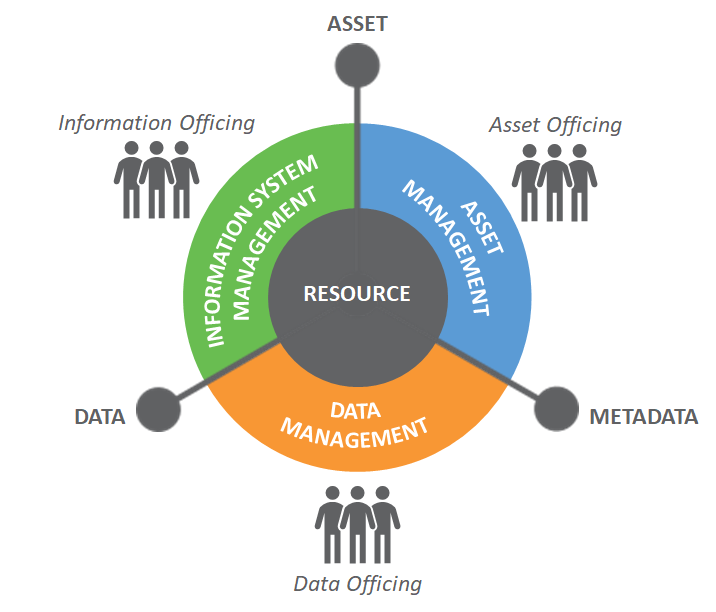“Andy runs an IT business. He has clients from all over the world.
Andy started as a small company but things eventually grew to become bigger, and within a few years his company emerged as one of the leading names in the industry. But during that time one mistake he did was to not focus on resource management. He did not take care of it.
As the business grew, he had to expand to his team. He hired ferociously, and today has a workforce of over hundred people. However, while all this hiring was going on, Andy realized that there came a point when things were not as efficient as they were when the business was small.
There were more people in his team, but they were still unable to meet deadlines. They were unable to deliver the quality that was expected, and more often than not it was complete chaos.
On a little contemplation, Andy could realize that although he had the suitable resources to do the job, there was no one to manage them. Everything seemed to be running haywire, since the resources were not being managed properly.
This was when Andy decided to sit with the managers and team leaders in his team, and focus strictly on managing the resources effectively.
Today, it has been close to 3 years since this contemplation. Andy invested the right efforts on resource management, and brought things back on track.”
This was Andy’s story. As you might have guessed, my motive behind sharing this story is to build a little background about our topic.
I decided to write on this topic because I’ve seen how casual leaders are about resource management, especially when they are in growing stages. I don’t want them to make mistakes that everyone else does.
In this post, we are going to take an in-depth look at resource management, and all the aspects related to it that make it such an integral parameter for determining the success of a business.
So, let us begin.
Building a successful business
To win the marketplace, first you must win the workplace. – Douglas Conant
As a leader, you try your best to build a successful business. You hire the right people, invest in the right technology and bring all the other resources that you think are imperative to make your business run smoothly. But is that it? Will doing all this assure you of success? The answer is a BIG NO!!!
“Want to build an efficient team? Stop using emails to manage their tasks and start using ProofHub.”
You cannot expect a business to run smoothly until you figure out ways to get maximum output from your resources. And, this is what resource management is all about.
How do we define resource management?
‘The efficient and effective development of an organization’s resources, including financial resources, inventory, human skills, production resources, or information technology (IT) and natural resources when they are needed.’
This is the definition used they use during organizational studies to define what resource management is.
However, in layman terms resource management can be defined as the process used by a business to manage the resources in the most effective possible manner.

Why is resource management important for an organization?
Before we look at the importance of the process, we must also have a clear understanding of what exactly does the term resource mean from an organization’s perspective.
Anything that an organization uses to execute a task/project is called a resource.
This means everything, from people employed by the organization to the software and hardware they use for efficient working could be considered as resources for the organization.
The definition of a resource in itself explains quite clearly why a business must implement meticulous resource management practices to obtain maximum efficiency.
However, if you want a one sentence answer to the question why resource management is important it has to be – optimal utilization of what you have so as to avoid any wastage.
Why do businesses fail to manage resources effectively?
Before we start to unfold the tips that can help managers effectively manage their resources, we need to first of all take a look at underlying reasons that cause this problem.
Here’s what I’ve figured out based on my personal experience as a leader, and on what I’ve learned from professionals in my network:
1. Poor planning
Your plans are nothing. Your planning is everything.
You can have the best plan in your mind. However, unless you know how to execute the plan, it is of no use.
The problem with businesses is that while keeping their focus completely on the plan they fail to realize how important it is to bring the same into execution. Whether it is task allocation, or workflow management, they don’t invest their efforts in creating what’s right for the team.
“Want to eliminate the challenges faced in project planning? Start using ProofHub to bring clarity in the processes.”
As a result of this, no one knows what they are supposed to do unless they are instructed for everything. When such circumstances arise, it starts to cripple the growth of the business.
Remember, you might have hired the best talent in business, but unless you know how to use that talent, they are going to be like a chained workforce. You are not going to get anything out of them until you figure out a way to use those resources well.
2. Lack of accountability
Having a team where people lack accountability is a sign of poor resource management.
Since managers don’t tend to plan how to use their resources, it creates a sense of casual approach and non-sincerity towards, which directly leads to poor accountability. Employees tend to get into the habit of micromanagement, and wait for instructions to do everything.
You cannot expect such a workforce to innovate and to be productive at their job. As a matter of fact, in such a situation things can quite easily turn from bad to worse because of the probability of mistakes arising since no one is willing to take charge on their own.
3. Not hiring the right person
Not hiring the right people for the job is another challenge that gives rise to poor resource management.
Since you don’t have people with expertise for the task that you intend to do, either you will have to assign more than required people or you need to invest more time to do the job than required.
Under both these situations, your business is at the receiving end of losses.
There are also instances when people with the right skill are assigned the wrong job that leads to such unwanted circumstances.
4. Adaptability issues
Adaptability is a key parameter that defines whether a business can become successful or not. Being open to change allows you to grow, sadly, though, there are leaders who fail to do so.
For example – sticking to old school ways of doing things like using emails for task management when you can use a project management software is one. Not evolving your workflows is another.
All these things can suffocate not just your team, but your work processes as well. And, a result of this you end up doing your business a lot of harm rather than good.
The cost of poor resource management
What might not look like a big problem to start with, efficient resource management is one of the biggest challenges that can do a business a lot of damage. From costing monetary losses to inefficiency in employees and high employee turnover, all these could start to happen when you don’t plan your resources effectively.
No matter how big or small your business is, it has to bear the consequences of poor resource management. If you are still wondering what could be the consequences, i have compiled a list of some of them below. Take a look and see for yourself:
1. Poor performance
One of the earliest indicators of poor resource management is a decline in team performance.
And, there can be various parameters that can indicate this. For instance, missing deadlines since you have set unrealistic expectations. Poor quality in task because you have the wrong person doing the job and son.
“Measure your team performance effectively with custom reports in ProofHub. Try it today.”
2. Rise of dissatisfaction
Poor performance never inspires anyone. Therefore dissatisfaction in the obvious outcome when the team starts to perform badly. Management starts asking questions on the employee’s capability, whereas the reality is something else. And all this can eventually give birth to a toxic work culture.
Also read: How To Create A High Performance Culture?
3. Financial losses
Financial losses are bound to happen when you are not using your resources efficiently. Poorly allocated resources can easily suck up your budget, since most of your efforts are going waste doing things that are not going to bring the desired results.
Proven practices that can help in resource management
The challenge with poor resource management is that it does not lead to a catastrophe at once. It leads to a series of small challenges that can eventually lead to something disastrous over the course of time.
Now to help you avoid that from happening, here’s what I recommend.
1. Find out the root cause of the problem
The first thing you need to do as a leader to eliminate poor resource management is to find out the reason behind the problem.
It is the inability of managers to fit the resources in their right place? Or, does it have something to do with poor planning and unrealistic expectations. It is only when you know the reason, you can eventually figure out the best plan to mitigate the problem.
The best way to reach the root cause of the problem is by sitting together with the team members and discussing things.
2. Use technology wherever possible
A smart way to eliminate the challenge of resource allocation and management is by using the right technology.
There are tools in the market like ProofHub that can help you in this regard.
For instance, in ProofHub you get the option to set custom roles. What this means is that you can eventually add people and give them access to specific sections or work areas that they use. In a similar way, you can add tasks and assign them to people to bring clarity in the workflows. You can even add comments and assign deadlines for these tasks so that everyone has a clarity of what to do and by when do they need to accomplish their work.
3. Embrace diversity in work culture
Another important thing you need to embrace as a leader to make your resource management efforts more effective is to embrace diversity in work culture.
Don’t expect everyone to do things the way you do. Let them find their comfort zone and do their own thing. Every individual brings a unique skill set; the reason why you hired them.
You need to understand that micromanagement is not only going to kill their role in the office, it might adversely affect their talent and confidence as well. Trust me, you don’t want that to happen to anyone in your team.
4. Manage expectations
What not many leaders and managers realize, in regard to resource management in particular is that one of the most common reasons behind it is unrealistic expectations.
I am not talking about just timely delivery when it comes to expectations. What I’m trying to say here is that by expecting a fish to climb a tree you are only proving that you are a fool.
You need to assign tasks to people according to their skills, expertise and experience. And, then set the expectations. At the same time, when setting these expectations don’t forget to clearly document them and share with the person who is assigned the job.
This clarity is of utmost importance in managing your resources in the most efficient way.
5. Build workflows
In fact, one of the easiest ways to bring clarity in resource allocation and management is by embracing workflows.
Project management software like ProofHub that come with custom workflows allow you to create custom workflows with tasks divided into stages. These stages reflect how the task will progress. Since everyone can be assigned to these stages, everyone has a clear picture of everything.
Workflows also bring a sense of stability in the team, and ensure that the demons of micromanagement stay away from your team.
6. Focus on employee happiness
One of the prime things about which not many people talk is employee happiness. It is important to keep your employees if you want to keep them working at their best.
Right from building a culture of collaboration to appreciating their efforts – you need to be smart enough to invest in everything in the right way, and at the right time.
Another added advantage of this would be building employee trust. That way they will always be willing to go out of their comfort zone to achieve their goals.
Wouldn’t you like that to happen with your team?
Resource management is a continuous process
One of the key things that you need to understand as a leader is that resource management is a continuous process. As the business continues to grow, you need to be able to adapt your resource management efforts according to its evolving needs.
While technology is always there to help you, it is your planning and vision as a leader that is going to lead the team and the business in the right direction.
There will be conflicts on the way, but you need to rise beyond them and keep your team together to grow it into a winning combination.
“Manage your teams, tasks, projects and resources efficiently. Start using ProofHub.”
Embrace the fact that you have been given an opportunity to lead people and get them to work for fulfilling what you started. And, the only way to achieve this is by implementing the right resource management tactics.
Now, you need to figure out how to do that. While I’ve tried to share with you everything related to resource management that can come handy, it is your effort at the end of the day that’s going to matter.
Conclusion
On a concluding note, all I’d like to say is that efficient resource management is going to help you build a winning team and a winning business. However, before that happens you need to develop a thorough understanding of the processes, why it matters and how you can eventually leverage it for your team to good effect.
Once you have all that sorted, it will become easier for you to manage your team, your business and your growth in the best possible manner.
The only question that now needs to be answered is – are you up for it?
If yes, the tips I’ve mentioned here are going to help you immensely in your voyage. Start practicing them and you are certainly going to see a positive change in your resource management endeavors.

